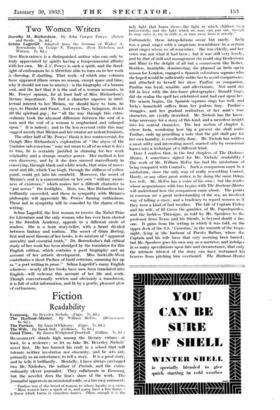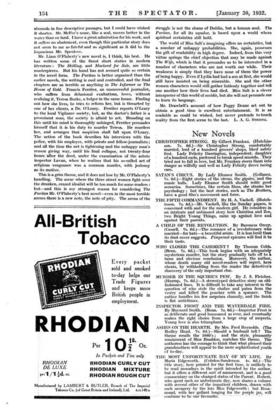Fiction
Readability
Evensong. By Beverley Nichols. (Cape. 7s. 6d.) The Harbour-Master. By William McFee. (Heinemann.
Its. ad.) The Puritan. By Liam O'Flaherty. (Cape. 7s. 6d.) The Wife. By Sarah Salt. (Gollanez. 7s. 6d.)
Good Time. By James Wedgwood Drawbell. (Collins. 7s. lid READABILITY stands high among the literary virtues—at least, to a reviewer ; so let us take Mr. Beverley Nichols' novel first. He has learned his craft in a school that will tolerate neither involution nor obscurity, and he sets out, primarily as an entertainer, to tell a story. It is a good story, and he tells it brilliantly. Mentally, I have always envisaged two Mr. Nicholses, the author of Prelude, and the extra- ordinarily clever journalist. They collaborate in Evensong, but the novelist does the lion's share of the work. The journalist appears in an occasional aside, or a too easy comment: "Pauline was of the breed of women to whom loyalty is a curse. " Most women have a spark of it, and many have a line flame— a flame which burns in countless homes. Often enough it is the Only light that burns there—the light to which children turn instinctively, and the light which no man can put out., though he may curse it, try to stifle it, or turn away from it utterly."
Fortunately, these interpolations occur but rarely. Irela was a great singer with a suspicious resemblance to a certain great singer whom we all remember. She was elderly, and her voice was not what it had been ; but it was still very lovely; and by dint of skill and management she could sing Desdenuma and Mimi to the delight of all but a connoisseur like Kober. Restless, insatiable, domineering, she planned an Irela opera season for London, engaged a Spanish coloratura soprano who she hoped would be sufficiently unlike her to avoid comparisons, and attached to herself her niece Pauline as companion. Pauline was loyal, sensible, and affectionate. Not until she fell in love with the free-lance photographer, Donald Gage, did she realise the spell her celebrated aunt had cast upon her. The season begins, the Spanish soprano sings too well, !old Irela's household suffers from her jealous fury. Pauline's struggles, and her gradual realisation of her aunt's true character, are vividly described. Mr. Nichols has the know- ledge necessary for a story of this kind, and a merciless insight into his central character. The last section of chapter 4, where Irela, wondering how big a present she shall make Pauline, ends up pencilling a note that the girl shall pay for her own laundry, is excellently done. Mr. Nichols has written a most witty and interesting novel, marred only by occasional lapses into a technique of a different kind.
Dare I confess that, in the first chapters of The Harbour- Master, 1 sometimes sighed for Mr. Nichols' readability ? The work of Mr. William MeFee has had the misfortune of being compared with Conrad's. Such a comparison must be a misfortune, since the only way of really resembling Conrail, Hardy, or any other great writer, is by doing the same things less well. Mr. MeFee has a voice of his own ; but the render whose acquaintance with him begins with The Barbour-Master will understand how the comparison came about. The points in common are a great understanding of the sea, an involved way of telling a story, and a tendency to regard women as if they were a kind of bad weather. The talc of Captain Fraley and his wife, of El Greco the gambler, of Mr. Papadopoulos, and the luckless Theroigne, as told by Mr. Spenlove to the professor from Texas and his friends, is beyond doubt a line one. It gains from the setting in which it was told, on the upper deck of the S.S. Camotan,' in the warmth of the tmpic night, lying in the harbour of Puerto Balbao, where the Captain and his wife have that very morning been buried ; but Mr. Spenlove goes his own way as a narrator, and indulges in so many speculations upon fate and circumstance, that only the intrinsic interest of the story can have restrained his hearers from pitching him overboard. The Harbour-Master
abounds in fine descriptive passages, but I could have wished it shorter. Mr. McFee's muse, like a seal, moves better in the water than on land. I have a great admiration for his work, and it suffers no abatement, even though this particular story does not seem to me as fateful and as significant as it did to the loquacious Mr. Spenlove.
Mr. Liam O'Flaherty's new novel is, I think, his best. He has written some of the finest short stories in modem literature : The Shilling, and Mackerel for Sale, are little masterpieces. But his hand has not seemed quite so certain in the novel form. The Puritan is better organized than the earlier novels, the writing is cool and controlled, and the final chapters are as terrible as anything in The Informer or The House of Gold. Francis Ferriter, an unsuccessful journalist, who suffers from delusional exaltations, loves, without realizing it, Teresa Burke, a lodger in the same house. Finding out how she lives, he tries to reform her, but is thwarted by one of her clients, a Dr. O'Leary. Ferriter reports O'Leary to the local Vigilance society, but, as the doctor's father is a prominent man, the society is afraid to act: Brooding on this until his mind is thoroughly unhinged, Ferriter persuades himself that it is his duty to murder Teresa. He murders her, and arranges that suspicion shall fall upon O'Leary. The action of the book describes his interviews with the police, with his employer, with priests and fellow-journalists ; and all the time the net is tightening and the unhappy man's reason giving way, • until his final collapse; not twenty-four hours lifter the deed, under the examination of the astute inspector Lavan, when he realizes that his so-called act of religious vengeance was a common murder, with jealousy
as its motive. -
This is a grim theme, and it does not lose by Mr. O'Flaherty's handling. The scene where the three street women fight over the drunken, crazed idealist will be too much for somereaders but—and this is my strongest reason for considering The Puritan Mr. O'Flaherty's best novel—even in the most terrible scenes there is a new note, the note of pity. The arena of the struggle is not the shims- of Dublin, but a human soul. The Puritan, for all its squalor, is based upon a world where spiritual certainties still hold.
The world of Miss Salt's imagining offers no certainties, but a number of unhappy probabilities. She, again, possesses the gift of readability in high degree. Indeed, from this very virtue springs the chief objection that may be made against The Wife, which is that it persuades us to be interested in a number of characters who are not worth our while. Their weakness is simply that they have none of them the power of being happy. Even if Lydia had had a son at first, she would still have insisted on being miserable. She and the other women characters would still gather listlessly together and tell one another how their lives had died.. Miss Salt is a. clever interpreter of this world of accidie, but she will not persuade me to learn its language.
Mr. Drawbell's account of how. Peggy Deane set. out to obtain , a good time is excellent entertainment. It is as readable as could be wished, but never pretends to touch reality from the first scene to the last. L. A. G. STRONG.





































 Previous page
Previous page